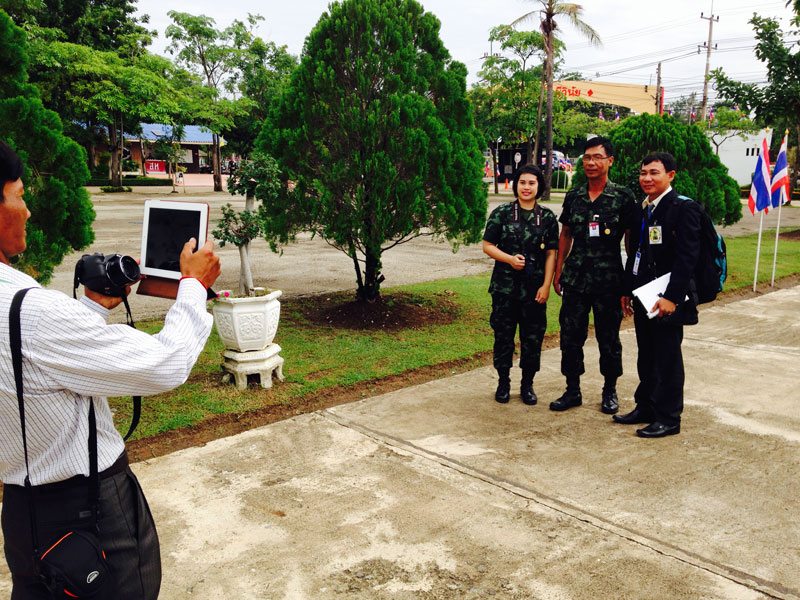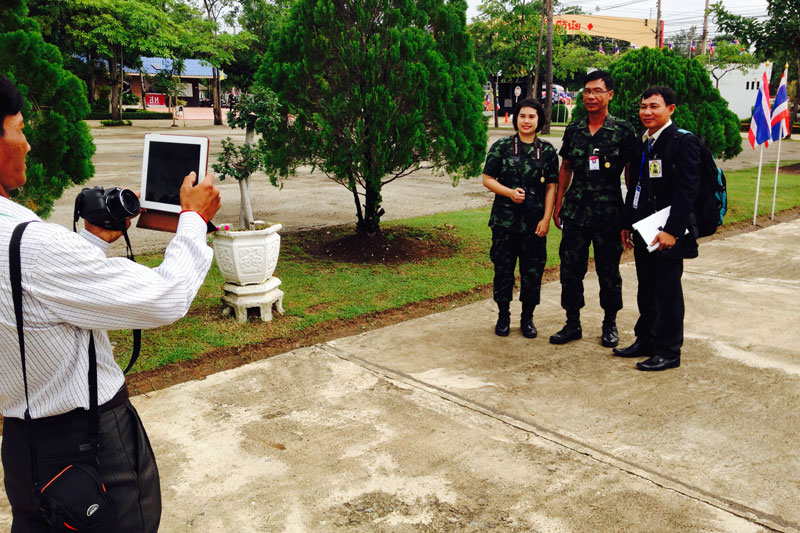SA KAEO PROVINCE, Thailand – At a press event on Friday aimed at “enhancing social understanding,” officials from Thailand’s military government met with nearly 100 Cambodian journalists here to defend the junta’s handling of a crackdown on illegal labor that began earlier this month.
Since seizing power in a coup late last month, the Thai junta has embarked on a public relations offensive to tamp down dissent against its regime, whose stated aim is “returning happiness to the people.” On Thursday, it announced that it would set up panels to monitor the media for signs of dissent.

During Friday’s press junket at the Sa Kaeo provincial military office, tattooed Thai soldiers in military fatigues were enlisted to serve coffee and cakes on tiny pink trays. Large posters at the building’s entrance showed scenes of Thai soldiers helping Cambodian migrant workers carry their bags and cuddling a migrant’s baby.
“The government wants all Cambodian media to print an article that says the Thai government did not crack down on Cambodian migrant workers in retaliation,” Sa Kaeo governor Phakarathorn Tianchai told journalists.
“It is not a policy. The new government wants to reform its administration. The junta wants to reorganize and live in peace.”
Journalists in attendance were warned not to ask questions about Thai politics by the event organizers, Sok Sovann and Prasit Sangrungrueng of the Union Media of Asean, an association of Thai and Cambodian journalists based in Sa Kaeo.
Nonetheless, the Thai officials were peppered with a number of critical questions about the migrant exodus, which came suddenly and left Cambodian officials initially unprepared.
“The new Thai government did not crack down on migrant workers,” Mr. Phakarathorn insisted. “The Thai government is very happy to answer this and understand each other. The government asserts again that the best way is to create a center for migrant workers to find work that is safe according to state law and provides a good salary.”
Asked about reports that Thai officials had shot out the tires of a car full of Cambodian migrants on June 15, causing two people to die, Sa Kaeo military commander Suriya Paowaree said he was aware of the incident.
“During that time, we were strengthening security. The soldiers tried to stop them, but the car driver tried to escape. We acted [because] their action was very rude.”
After proclamations of friendship, photo sessions, and a lunch of green curry and fried chicken drumsticks, journalists were driven to visit a new “one-stop office” set up by Thai authorities near the Aranyaprathet border crossing. The office is meant to bring Cambodian migrant workers back into the country rapidly and legally.
Senior Sergeant Sakorn Sukosi of the Thai Immigration Police said around 110 new staff members had been brought in to man the operation. Around 100 Cambodian workers were processed on Thursday, the center’s first day in service, but hundreds more were streaming through on Friday.
As Cambodians walked across the border, they were given numbered tags to hang around their necks. They were then lined up and ushered into an air-conditioned office, where they waited at stations to have their identity documents checked and be photographed and fingerprinted. The cost of a new migration permit was just 80 baht, around $2.50, down from 800 baht, about $25, before the crackdown.
After finishing the process, Sun Phearom, 23, and his three brothers, Pheara, Phea and Roat, relaxed under a tent as they clutched their new pink Thai identity cards, good for two months. All of them had migrated for the first time in April from their hometown in Banteay Meanchey province, enlisting the services of a local people-smuggler who took them across the border and find them jobs in Bangkok for a fee of about $67 each.
They had been happy with their new jobs at a large food market in Bangkok, where they worked ladling out soup and filling buns with chopped meat, for around $10 a day. But they returned home two weeks ago on their parents’ orders.
“We heard the Thai military was shooting Cambodians. We heard from one to another, and it made our parents concerned, and they called us home,” said Phearom.
The brothers said they had been issued temporary identification books by Banteay Meanchey authorities in lieu of applying for an official Cambodian passport, but this was enough to get them legally into Thailand for the next year. The books cost just 25,000 riel, about $6, a fraction of the sum they had paid the smuggler.
“I’m feeling comfortable, not like previously, because now I’m working legally and not illegally,” Phearom said. “I feel safe.”
Banteay Meanchey deputy governor Oum Reatrey, who also attended the event, spent time chatting with returned migrants and said he was impressed with the center, but noted that the cheerful operation was also a deft public relations move.
“That is part of the Thai junta—they lure you,” he said. “You know the Thai junta, they are trying to eliminate their own previous acts.”
After the tour, Mr. Sovann of the Union Media of Asean, who speaks fluent Thai and is sympathetic to the new military government, offered a reporter a handful of mangosteens from a tree he said was 100 years old. He explained that he was inspired to organize Friday’s event because of misinformation in the Cambodian press.
“The military government vowed to clean up all corrupt activity, including police officials or companies colluding with them to get migrant workers to give bribes,” he said. “The Thai government holding power needs to clean up all this stuff. Our Cambodian media has a lack of information for migrant workers—that is the problem. We cannot help our own people.”
Mr. Sovann added that the perks of the junket tour—which included a trip to the countryside, a night at a hilltop resort, and a Saturday morning outing to watch a marathon—were being paid for by wealthy Thai journalists who were members of UMA.
“You must acknowledge that the Thai media has its own riches,” he said cryptically.
One of these wealthy Thais was Mr. Prasit, the secretary-general of UMA, who had lavishly praised the Sa Kaeo authorities earlier in the day for doing “very good work to help Cambodian migrants return home, whether it was raining or the sun was beating down, both day and night.”
According to Mr. Sovann, Mr. Prasit cut his teeth as a journalist covering the Khmer Rouge in the 1990s before becoming a wealthy businessman.
“He got rich through Cambodia, so now he needs to feed back and help the next Khmer media generation,” he explained.
The Cambodians seemed to appreciate the help.
Thorn Samnang of Domnung Thngai Nih newspaper said he planned to write an article describing the efficiency of the new migrant-processing center.
“It very changed my mind, because the Thai government makes it easy for the Khmer people,” he said, before heading off to the resort. “I will write it for my people.”




